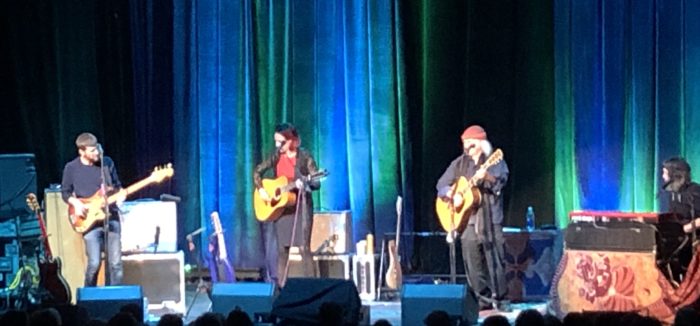David Crosby, Michael League, Becca Stevens and Michelle Willis – billed as David Crosby & Friends, but whom Crosby refers to as the Lighthouse Band, and which cut the just-released Here if You Listen – came into Kent and over the course of an hour-and-40-minute performance proved themselves a top-tier acoustic/harmony group that, with the right setlist, could be a salve for those still mourning the loss of Crosby, Stills and Nash.
But with only a few exceptions – excellent exceptions but too few nonetheless – the quartet mostly stuck with 21st-century material. As such, the sold-out Kent Stage was much more subdued than when Crosby rolled through with an electric band almost exactly one year ago.
With Snarky Puppy’s League on acoustic and electric guitars and bass; Stevens on electric and acoustic mandolins, six- and 12-string guitars and ukulele; Willis on keys; and all sharing lead and harmony vocals with Crosby, who played occasional acoustic guitar, the band employed interesting instrumentation throughout the 18-song performance, delivered in sets of 55 and 45 minutes, respectively.
Aligned before a black curtain that shimmered with blues and greens and yellows and reds, the quartet played and sang beautifully on the opening five tracks that would have left anyone unfamiliar with the four records Crosby’s released since 2014 scratching their heads. Highlighted by “1974,” a Here if You Listen number based on a vintage riff League found on Crosby’s computer, this opening salvo clearly pleased Crosby even as the 77-year-old noted it was “grim” none of his bandmates had been born when he recorded the snippet.
“I’m the luckiest son of a bitch you know,” Crosby said as his Friends left him alone to perform “Laughing,” a song written for George Harrison to warn him against putting too much stock in people who claim to be enlightened. It was here it became evident that even though he remains one of rock and folk’s finest male vocalists, Crosby’s voice is beginning to show the first signs of wear as he is no longer sustaining notes for as long as he used to and occasionally wavered out of key.
This was remedied when League, Stevens and Willis returned for an a cappella version of “What Are Their Names?,” another track from Crosby’s under-appreciated 1971 solo debut, If I Could Only Remember My Name.
Infusing his good-natured banter with a cartoonish, shaky old-man’s voice that often referred to the Civil War he had experienced, Crosby showed great deference to his bandmates, giving the beguiling Stevens, whose upbeat stage presence infused the show with a shot of adrenaline, the spotlight on her solo track “Regina” and allowing Willis to take the lead on a soulful, almost jazzy version of “Janet,” a Here if You Listen standout.
Whether they were playing three acoustic guitars; acoustic guitar and electric mandolin; two acoustics and an electric guitar; or bass and mandolin – all aided by Willis’ two banks of keys – the group performed exquisitely as they improved upon the studio versions of mid-tier songs such as “The Us Below,” “Things We Do for Love” and “Look in Their Eyes.”
But when they got to “Guinnevere” late in the second set, it became clear the foursome, which is making a documentary of the tour, had missed a huge opportunity by skipping over so many of Crosby’s superior Byrd’s, solo, Crosby and Nash, CSN, CSNY and CPR tracks. Male and female voice wrapping around one another gave the song a new feel while taking nothing from its old appeal.
This “Guinnevere” was a shimmering gem, as was a tender rendition of “Carry Me,” a stretched out reading of “Déjà Vu,” on which League played lead bass and Willis went wild on the keys, and an absolutely stunning rearrangement of “Woodstock,” on which each band member sang lead and which set the Kent Stage figuratively aflame as the first song in the encore slot.
The show-closing “Ohio” had the same effect, although I could not bring myself to join in on the enthusiastic clapping and chanting of four dead in Ohio just a few miles away from where the event that inspired Neil Young to write the song took place.



1 Comment comments associated with this post
bodhi heeren
December 17, 2018 at 5:20 amUnlike the reviewer I really appreciate a legendary 77 year old performer going out there playing fresh new songs. Instead of relying on the back catalogue and playing it safe.